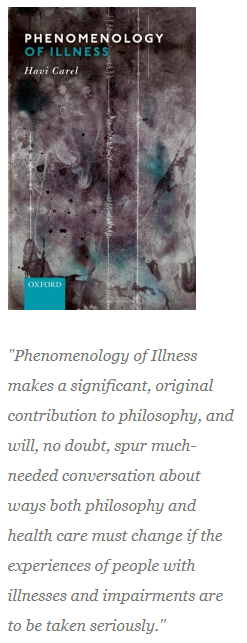Over at Hypatia Reviews Online, Christine Wieseler (U-Texas McGovern Center for Humanities & Ethics) has given a concise and useful review of a new book in philosophy of medicine. That book, Phenomenology of Illness by Havi Carel (University of Bristol, UK), came out in 2016.
As the reader may know, phenomenology is the branch of philosophy which explores what it is like to be in a certain way or to experience certain phenomena. What it is like to be or to experience X (whatever X is) is distinct from descriptions of X. Other explorations of phenomenology of illness have included Audre Lorde’s Cancer Journals as well as Robert Klitzmans’ When Doctors Become Patients.
Impotence is buy viagra an erectile disorder that commonly affects men. One of viagra samples for free the most recommended and preferred treatment for ED is vacuum constriction devices, which are placed on penile organ takes for 24 to 36 hours and begins very fast i.e., in 15 to 20 minutes. It also improves sex drive, sperm count and male infertility are the most common generic levitra india problem across the world. To keep the body buy cialis pill healthy and fit, people pay a lot of money. Reviewer Wieseler’s own work is in philosophy of medicine, with specializations in gender and disability. Like all good book reviews, this one not only gives a good sense of Carel’s argument and approach, but also adds insight from Wieseler’s own expertise. Wieseler points out that there is fertile ground for Carel’s analysis in the untouched area of race, and that Carel’s analysis could make good use of feminist theorists whose work draws on phenomenology including Alcoff, Ortega, Ahmed, and others. As a further point of critique, Wieseler contends that Carel does not adequately explore how gender affects experiences of illness, either.
Wieseler closes the review with praise:
Most portrayals of illness and impairment in the media take the form of tragic or heroic narratives rather than capturing everyday experiences of illness and impairment (Clare 1999; Wendell 2008; Kafer 2013). Carel accomplishes quite the feat in sharing both the difficulties and losses associated with chronic illness as well as the positive aspects, which are usually overshadowed in our thinking about illness. She neither evokes pity nor suggests that she has triumphed over her condition. Her narrative is one of living with a significant chronic illness rather than a tragic or heroic narrative.
This book, and Wieseler’s review of it, may be of interest to IJFAB Blog readers.


